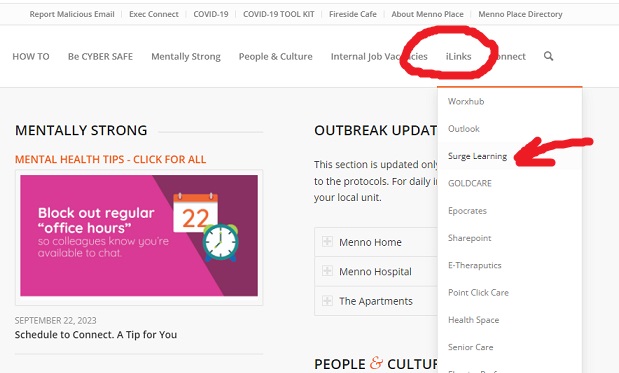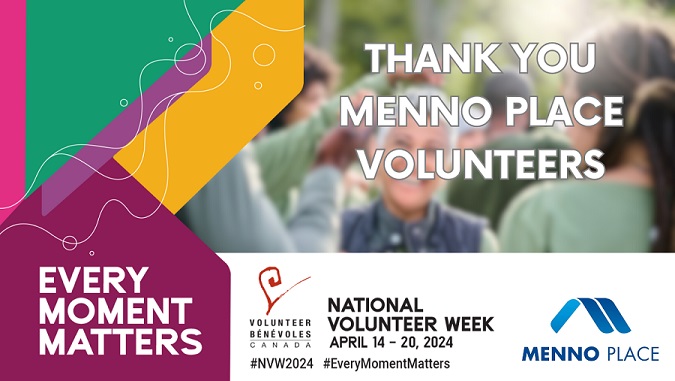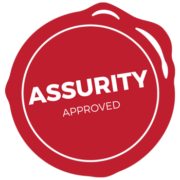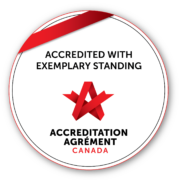Happy Administrative Professionals’ Day!
We want to say a huge thank you to the administrative professionals on our campus! To Pearl, Diana, and all of the unit clerks in Menno Home and Menno Hospital – we are so glad you’re here!

We want to say a huge thank you to the administrative professionals on our campus! To Pearl, Diana, and all of the unit clerks in Menno Home and Menno Hospital – we are so glad you’re here!

Code Silver is a new code that has been recently introduced. It is an emergency code education that outlines procedures in the event of an active weapons attack.
All Menno Place staff are required to be educated on Code Silver by taking the course on Surge Learning. This is a 15 min paid education if completed by May 15, 2024.
Completion reports will be sent to staffing for reimbursement. You do not need to fill out an LOA form. If the course is completed after May 15, 2024 the staff member will not receive payment.
Staff can access Surge Learning through the iLinks in the top right side of this website.

If you forgot your username it is the same as what you use for PCC/POC/Worxhub with the site code corp. + the first 4 letters of your last name and the first letter of your first name. For example for someone named John Smith the username would be corp.smitj . If you need to reset your password you can click “Forgot password” on the Surge Learning log in page.
If you need help recovering your username or password for Surge Learning please contact Lana Murray lana.murray@mennoplace.ca / Sandra Hays sandra.hayes@mennoplace.ca. The Managers of care – Anitha Thomas anitha.thomas@mennoplace.ca and Kahan Rekhia kahan.rekhia@mennoplace.ca will also be able to help with username recovery/password reset.
Once you are logged in to Surge Learning you should see “Code Silver – Emergency Response” in your list of courses. If you need a refresher on how to access Surge Learning instructions are available by clicking here.
*****
The following message has been sent to all medical staff on behalf of John Lavery, Executive Director, Health Emergency Management BC
HEMBC to launch new code and new training to support active attacker situations
October 3, 2022
Unfortunately, active attacker threats—when an individual actively engaged in harming, killing or attempting to kill others with a weapon—are a common and increasing occurrence around the world. In health care, the implementation of policies and procedures has now become common practice in many health-care facilities across the country as well as in the United States to better support staff in responding to these events.
Health Emergency Management BC (HEMBC) has worked with the Ministry of Health to develop a new code that provides guidance to facilities and staff in the event of an active attacker situation. Code Silver outlines the principles of run, hide or fight should an individual become actively engaged in harming, killing or attempting to kill others with a weapon. Because active attacker situations evolve quickly—and often before police arrive on scene—it is important to know what to do to protect yourself and your patients, clients and residents.
New training now available
Training is now available for everyone working in acute, community or at corporate sites. The online module available through Surge Learning only takes 10-15 minutes to complete and can be done at your own pace.
It is important that everyone working in our facilities take the training and be aware of the procedures to follow in the event of an active attacker threat. As a member of the medical staff team, others may look to you for guidance or support in the event of an emergency. Taking the training is a great opportunity to not only enhance your own personal preparedness, but to support those around you should the unthinkable happen.
Over the coming months, Code Silver will be operationalized at each site across the province. Stay tuned for more information.
Learn practical applications to identify risk factors of violence and de-escalation techniques at a Violence Prevention Workshop on Monday, May 13, 2024. Space is limited. Register soon!
Last day to take the SafeCareBC Member Survey – You could win a Prize!
This week Andy Capesinio, Chaplain for Menno Hospital gave the devotional and we prayed for Bas Kervel and the whole Support Services team. You can watch the video by clicking the play button below.
16 April 2024 – Staff Prayer – Andy Capesinio from Andy Capesinio on Vimeo.

It’s National Volunteer Week! Did you know that volunteers at Menno Place contributed 4,663 hours in 2023 in departments all across the campus? Take a minute to thank a volunteer today or use the form below to send in your thanks and comments.
The province of BC has announced the end of respiratory season and the launch of the spring COVID-19 vaccine booster campaign. With decreased rates of respiratory disease across the province, BC is ceasing the additional infection prevention and control measures implemented in September 2023.
This means that staff who work in Long-Term Care and Assisted Living buildings are no longer required to wear masks.
Beginning Monday, April 8, 2024:
As always, we ask staff to please stay home if you are ill.
Thank you for working with us these past months by wearing a mask. You can read the full press release from the BC Government News site here: https://news.gov.bc.ca/releases/2024HLTH0036-000506 . The removal of the mask mandate is in the third paragraph.
Please join me in welcoming Nicole Wiebe as the new Executive Assistant. Nicole’s first day will be April 26th.
Are you an MBS or an Employees’ Association Member at Menno Home or Apartments? Do you have questions about Empire Life, your new benefits provider? Join us for a information session on Wednesday, April 17. RSVP today!
Please welcome our newest team member, Amanda Brady, to the Payroll Finance Team!
USE OF MATERIALS
All materials available on the www.MennoPlaceStaff.com website are published for the sole purpose of keeping informed those individuals who work on the Menno Place campus. These materials may be shared with others who are also connected to the Menno Place campus in this same way. No content or material may be used or shared in any other context without the written permission of the Menno Place Director who oversees communications.


